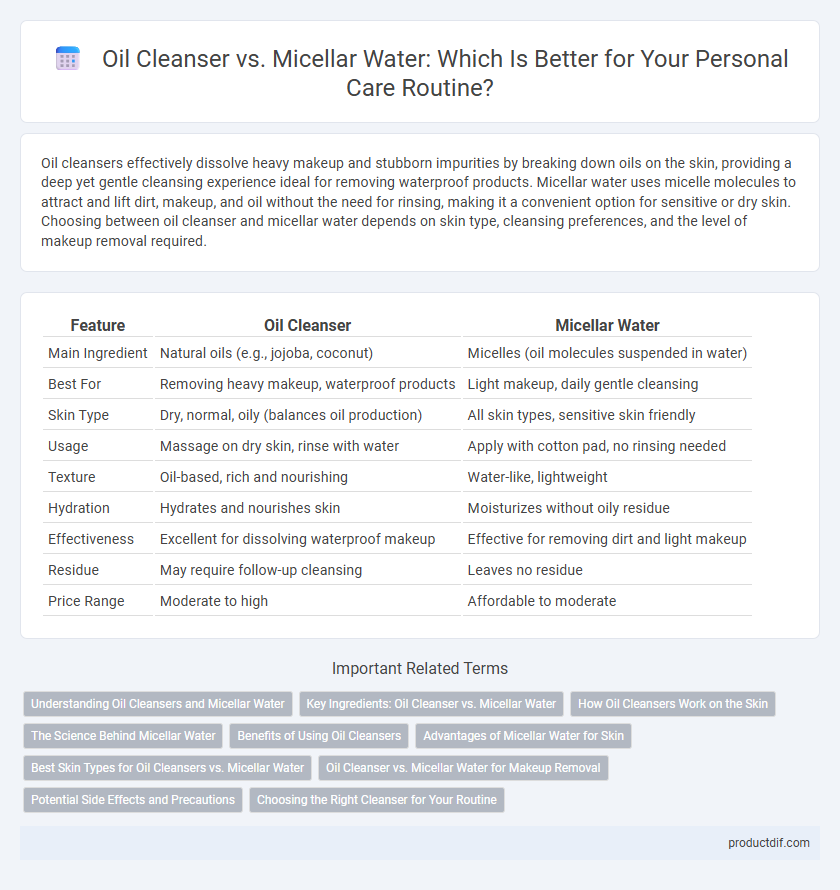Oil cleansers effectively dissolve heavy makeup and stubborn impurities by breaking down oils on the skin, providing a deep yet gentle cleansing experience ideal for removing waterproof products. Micellar water uses micelle molecules to attract and lift dirt, makeup, and oil without the need for rinsing, making it a convenient option for sensitive or dry skin. Choosing between oil cleanser and micellar water depends on skin type, cleansing preferences, and the level of makeup removal required.
Table of Comparison
| Feature | Oil Cleanser | Micellar Water |
|---|---|---|
| Main Ingredient | Natural oils (e.g., jojoba, coconut) | Micelles (oil molecules suspended in water) |
| Best For | Removing heavy makeup, waterproof products | Light makeup, daily gentle cleansing |
| Skin Type | Dry, normal, oily (balances oil production) | All skin types, sensitive skin friendly |
| Usage | Massage on dry skin, rinse with water | Apply with cotton pad, no rinsing needed |
| Texture | Oil-based, rich and nourishing | Water-like, lightweight |
| Hydration | Hydrates and nourishes skin | Moisturizes without oily residue |
| Effectiveness | Excellent for dissolving waterproof makeup | Effective for removing dirt and light makeup |
| Residue | May require follow-up cleansing | Leaves no residue |
| Price Range | Moderate to high | Affordable to moderate |
Understanding Oil Cleansers and Micellar Water
Oil cleansers effectively dissolve makeup, sunscreen, and excess sebum by breaking down oil-based impurities without stripping natural skin oils. Micellar water contains tiny micelle molecules that attract dirt, oil, and makeup, making it a gentle yet efficient option for removing surface impurities and hydrating the skin. Both products support different cleansing needs: oil cleansers provide deep cleansing for oily and makeup-heavy skin, while micellar water suits sensitive and dry skin types needing mild cleansing and hydration.
Key Ingredients: Oil Cleanser vs. Micellar Water
Oil cleansers contain hydrating oils such as jojoba, argan, or coconut oil that dissolve makeup and impurities while nourishing the skin's natural moisture barrier. Micellar water features micelles, tiny oil molecules suspended in soft water, which attract and lift dirt and oil without rinsing, making it ideal for sensitive skin. Both products use different mechanisms and key ingredients to effectively cleanse while catering to varying skin types and preferences.
How Oil Cleansers Work on the Skin
Oil cleansers dissolve makeup, sunscreen, and excess sebum by breaking down oil-based impurities on the skin, effectively unclogging pores and reducing buildup. Their hydrophobic nature allows them to bind with oils without stripping the skin's natural moisture barrier, promoting a balanced and hydrated complexion. Unlike micellar water, which uses micelles to attract dirt and oil, oil cleansers rely on emulsification to lift impurities, making them particularly effective for deep cleansing and removing waterproof makeup.
The Science Behind Micellar Water
Micellar water contains micelles, tiny oil molecules suspended in soft water that attract and lift away dirt, oil, and makeup from the skin without harsh rubbing. Unlike oil cleansers that emulsify oils with water, micellar water uses the unique structure of micelles to cleanse effectively while maintaining the skin's natural moisture barrier. This gentle yet efficient cleansing mechanism makes micellar water suitable for sensitive skin and quick makeup removal.
Benefits of Using Oil Cleansers
Oil cleansers effectively dissolve heavy makeup, sunscreen, and excess sebum, providing deep yet gentle cleansing without stripping the skin's natural moisture barrier. Rich in nourishing ingredients like essential fatty acids and antioxidants, oil cleansers help maintain skin hydration and promote a balanced, healthy complexion. Their ability to remove impurities while enhancing skin softness makes them ideal for all skin types, especially dry or sensitive skin.
Advantages of Micellar Water for Skin
Micellar water offers a gentle yet effective cleansing solution that removes dirt, oil, and makeup without the need for harsh rubbing or rinsing, making it ideal for sensitive and dry skin types. Its microscopic micelles attract impurities while maintaining the skin's natural moisture balance, reducing the risk of irritation and dryness often associated with stronger cleansers. Lightweight and non-comedogenic, micellar water helps maintain clear pores and supports a balanced complexion, promoting healthier skin over time.
Best Skin Types for Oil Cleansers vs. Micellar Water
Oil cleansers are ideal for dry and sensitive skin due to their deep hydration and ability to dissolve heavy makeup and sunscreen without stripping natural oils. Micellar water suits oily and combination skin by effectively removing dirt and excess sebum while maintaining the skin's natural barrier. Choosing between oil cleanser and micellar water depends on skin type and cleansing needs for optimal skin health.
Oil Cleanser vs. Micellar Water for Makeup Removal
Oil cleansers effectively dissolve stubborn, waterproof makeup and excess sebum by breaking down oils, making them ideal for deep cleansing. Micellar water, containing micelle molecules, gently lifts away surface impurities and light makeup without rinsing, suitable for sensitive or dry skin types. Choosing between oil cleanser vs. micellar water depends on your skin type and makeup wear, with oil cleansers offering thorough removal and micellar water providing a quick, non-rinse option.
Potential Side Effects and Precautions
Oil cleansers may cause breakouts or irritation in individuals with oily or acne-prone skin due to their heavy, oil-based formula. Micellar water, though generally gentle, can sometimes lead to dryness or allergic reactions if it contains alcohol or fragrances. Patch testing both products before full use is essential to avoid adverse reactions and ensure compatibility with sensitive skin types.
Choosing the Right Cleanser for Your Routine
Oil cleansers effectively dissolve makeup and sunscreen, making them ideal for removing heavy or waterproof products, while micellar water gently cleanses and refreshes skin without rinsing. For dry or sensitive skin, oil cleansers provide hydration and nourishment, whereas micellar water suits those seeking a quick, no-rinse option for light cleansing. Selecting the right cleanser depends on skin type, makeup use, and personal preference for texture and removal ease.
Oil cleanser vs Micellar water Infographic

 productdif.com
productdif.com